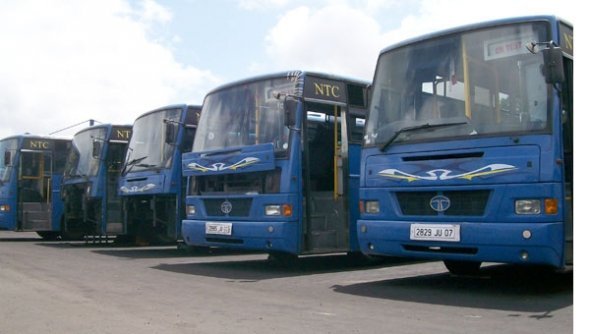Transport En Commun : CNT, gel du Contrat de Carburant de Rs 850 M

En principe, le contrat devait être alloué à Indian Oil (Mauritius) Limited. Un des soumissionnaires, Vivo Energy (Mauritius) Limited, a objecté formellement à la méthode adoptée par le Bid Evaluation Committee de la CNT par rapport à l’application de la TVA à 15 %, susceptible de favoriser Indian Oil (Mauritius) Ltd pour l’approvisionnement de 20 millions de litres de mazout pour cette année.
Avant de saisir la Cour suprême pour une Judicial Review de cette décision, Vivo Energy (Mauritius) Limited avait sollicité l’intervention de l’Independent Review Panel (IRP) aux termes des dispositions de la Public Procurement Act pour rendre caduque la décision de la CNT en faveur d’Indian Oil (Mauritius) Limited. Mais les membres de cette instance étaient partagés avec l’un des assesseurs, l’ex-Senior Magistrate de la Cour intermédiaire Denis Vellien, soumettant un Minority Dissenting Report prenant à contre-pied le président de l’IRP, le Dr Allybokus et l’autre assesseur, Esther Hanoomanjee.
Dès le départ, Vivo Energy (Mauritius) Limited avait contesté la méthodologie adoptée par le Bid Evaluation Committee de la CNT pour l’octroi de ce contrat. « The percentage discount offered by Vivo Energy (Mauritius) Ltd per litre was 2.570 on the wholesale price per litre, exclusive of VAT ; i. e. on the rate of Rs 34,3381 per litre. On the other hand, the selected bidder, Messrs Indian Oil (Mauritius) Ltd, had offered a discount of 2.331 % on the wholesale price per litre and inclusive of VAT i. e. on the rate of Rs 39.4888 per litre. The above implies that the corrected percentage discount offered by Vivo Energy (Mauritius) Ltd on the wholesale price per litre was 2.234 %, inclusive of VAT », soutient la CNT pour allouer ce contrat de Rs 850 millions à Indian Oil (Mauritius) Limited.
Dans un Dissenting Ruling, l’ex-Senior Magistrate Vellien contredit le président de l’IRP et Esther Hanoomanjee, qui avait justifié la démarche de la CNT en faveur d’Indian Oil. Dans les attendus de ce ruling minoritaire, il prend le soin d’analyser les clauses 10 et 12 de la Value Added Tax Act, qui est en vigueur depuis le mois de septembre 1998, en l’occurrence le taux de la TVA et la Value of Taxable Supplies.
“Value of supply”
« It is clear from these provisions that the rate of VAT is statutorily fixed by Law and that the value of any taxable supply shall be taken to be such amount, as with the addition of the VAT chargeable is equal to consideration », s’appesantit Denis Vellien. Il s’appuie également sur des jugements du Privy Council en date du 13 décembre 2010 dans une autre affaire impliquant la CNT.
« The Board of the Judicial Committee referred to the provisions of Section 12 (1) and (2) because they are important and they explain how to ascertain the value of supply which is the amount on which VAT is to be charged at the appropriate rate. The Board also held that “its effect can be stated by the formula S + 1/10S = C, where S is the value of the supply and C is the consideration. That is the case whether the supplier stipulates for an inclusive price (say Rs 110,000) or for a basic price (say Rs 100,000) plus VAT”. This is an indication that the value of supply is first subjected to discount and it is finally on that reduced price that VAT will be charged », souligne Denis Vellien.
Le Minority Dissenting Report, qui cite des autorités françaises et le guide de Her Majesty’s Revenue and Customs en Grande-Bretagne, maintient que « you must charge VAT on the discounted price and not on the full price which means in clearer terms, that VAT is chargeable on discounted price. Furthermore, discount on prices inclusive VAT will yield discount on the appropriate rate of VAT which is not provided in the VAT Act of 1998. Accordingly, there is only one mode of calculation of chargeable amount of VAT. Obviously it is so because otherwise it might reach different amounts of VAT in respect of the same selling price ».
Les conseils légaux de Vivo Energy (Mauritius) Limited, dont Me André Robert, avoué, demandent à la Cour suprême de renverser cette décision de la CNT et de la majorité des membres de l’IRP vu que « it is a decision which does not take into account the facts that (i) it is not possible to give discount on Value Added Tax ; (ii) it is Vivo Energy (Mauritius) Ltd which gave the highest discount and the lowest tenderer is Vivo Energy (Mauritius) Ltd ».
Cette contestation, qui a été logée en Cour suprême le 12 avril, a été entendue Pro-Forma hier. Elle sera appelée une nouvelle fois devant le chef juge le 22 courant.
Nouvelles connexes


